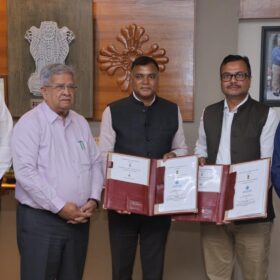From pv magazine International
For researchers, there is no shortage of promising materials for new energy storage applications. Narrowing down this list of possibilities, to find combinations of materials that overcomes problems with today’s battery technologies without creating new ones, is where it gets difficult.
Since 2016, a group of scientists at Russia’s St. Petersburg University has investigated a group of materials known as redox-active nitroxyl-containing polymers. These materials are known to have high energy density and a fast redox potential – bringing the potential for fast-charging batteries. They are held back, however, by low conductivity.
As a way to overcome this, the group set out to synthesize a polymer from a nickel-salen complex, which acts as a molecular wire to which nitroxyl “pendants” are attached. “We came up with the concept of this material in 2016. When studying the charge transport mechanism in this class of compounds, we discovered that there are two key directions of development,” explained Oleg Levin, professor of electrochemistry at St. Petersburg University. “Firstly, these compounds can be used as a protective layer to cover the main conductor cable of the battery, which would be otherwise made of traditional lithium-ion battery materials. And secondly, they can be used as an active component of electrochemical energy storage materials,”
The group first simulated the characteristics of different materials in the group, to understand the best combinations. Then they began to synthesize the compounds, eventually finding one that was stable and efficient enough to work with, and began testing its storage capabilities. Results of this testing are found in the paper The Fast and the Capacious: A [Ni(Salen)]‐TEMPO Redox‐Conducting Polymer for Organic Batteries, published in Batteries and Supercaps.
“NiSalen simultaneously serves as a charge collector for nitroxyl pendants and supports the redox capacity of the material,” states the group in the paper. “This novel polymer exhibits a specific capacity of up to 91.5 mAh g−1, retaining 87 % of its theoretical capacity at 800 C and more than 30 % at as high as 3000 C (66 % capacity retention after 2000 cycles).”
Levin further notes that batteries incorporating the polymer can charge up to ten times faster than today’s lithium-ion batteries, and overcome many more of the problems with this technology. The next step for the researchers is to work on improving the capacity, which they estimate is currently 30 to 40% below commercial lithium-ion.
“The new battery is capable of operating at low temperatures and will be an excellent option where fast charging is crucial. It is safe to use – there is nothing that may pose a combustion hazard, unlike the cobalt-based batteries that are widespread today,” states Levin. “It also contains significantly less metals that can cause environmental harm. Nickel is present in our polymer in a small amount, but there is much less of it than in lithium-ion batteries.”
This content is protected by copyright and may not be reused. If you want to cooperate with us and would like to reuse some of our content, please contact: editors@pv-magazine.com.









By submitting this form you agree to pv magazine using your data for the purposes of publishing your comment.
Your personal data will only be disclosed or otherwise transmitted to third parties for the purposes of spam filtering or if this is necessary for technical maintenance of the website. Any other transfer to third parties will not take place unless this is justified on the basis of applicable data protection regulations or if pv magazine is legally obliged to do so.
You may revoke this consent at any time with effect for the future, in which case your personal data will be deleted immediately. Otherwise, your data will be deleted if pv magazine has processed your request or the purpose of data storage is fulfilled.
Further information on data privacy can be found in our Data Protection Policy.